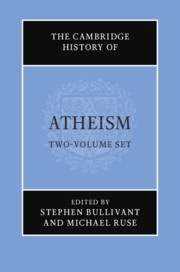Book contents
- The Cambridge History of Atheism
- The Cambridge History of Atheism
- Copyright page
- Dedication
- Contents
- Acknowledgments
- Contributors
- Introduction
- Part I Preliminaries
- Part II Atheisms in History
- 4 Pre-modern Japan
- 5 Ancient Greece
- 6 The Roman Empire
- 7 India: 1500 BC to AD 1200
- 8 Christian Europe
- 9 The Islamic World
- Part III Reformation, Renaissance, Enlightenment
- Part IV Classical Modernity: Philosophical and Scientific Currents
- Part V Classical Modernity: Social and Political Currents
- Part VI Twentieth and Twenty-First Centuries: Intellectual and Artistic Currents
- Part VII Lived Atheism in the Twentieth- and Twenty-First Centuries: Case-Studies
- Part VIII Emerging Atheisms in the Twenty-First Century
- Part IX Conclusion
- Index
- References
6 - The Roman Empire
from Part II - Atheisms in History
Published online by Cambridge University Press: 25 September 2021
- The Cambridge History of Atheism
- The Cambridge History of Atheism
- Copyright page
- Dedication
- Contents
- Acknowledgments
- Contributors
- Introduction
- Part I Preliminaries
- Part II Atheisms in History
- 4 Pre-modern Japan
- 5 Ancient Greece
- 6 The Roman Empire
- 7 India: 1500 BC to AD 1200
- 8 Christian Europe
- 9 The Islamic World
- Part III Reformation, Renaissance, Enlightenment
- Part IV Classical Modernity: Philosophical and Scientific Currents
- Part V Classical Modernity: Social and Political Currents
- Part VI Twentieth and Twenty-First Centuries: Intellectual and Artistic Currents
- Part VII Lived Atheism in the Twentieth- and Twenty-First Centuries: Case-Studies
- Part VIII Emerging Atheisms in the Twenty-First Century
- Part IX Conclusion
- Index
- References
Summary
In his list of synonyms for a godless man, átheos, Iulius Pollux enumerates as diverse characterizations someone who is impious, asebés, or accursed, enagés, someone who hates the gods, misótheos, or is hated by the gods, theomisés, someone who is impure or uninitiated, bébelos, or lawless, athémitos. For godlessness, atheótes, he has unholyness, anosiótes, or indifference towards the divine, oligoría peri to theion. Pollux (around AD 135–93) held the chair of rhetoric in Athens and was part of the so-called Second Sophistic, an intellectual movement in the second century AD that sought to create a kind of renaissance of the classic, especially Athenian, culture from the fifth and fourth centuries BC.
- Type
- Chapter
- Information
- The Cambridge History of Atheism , pp. 100 - 117Publisher: Cambridge University PressPrint publication year: 2021
References
- 1
- Cited by

